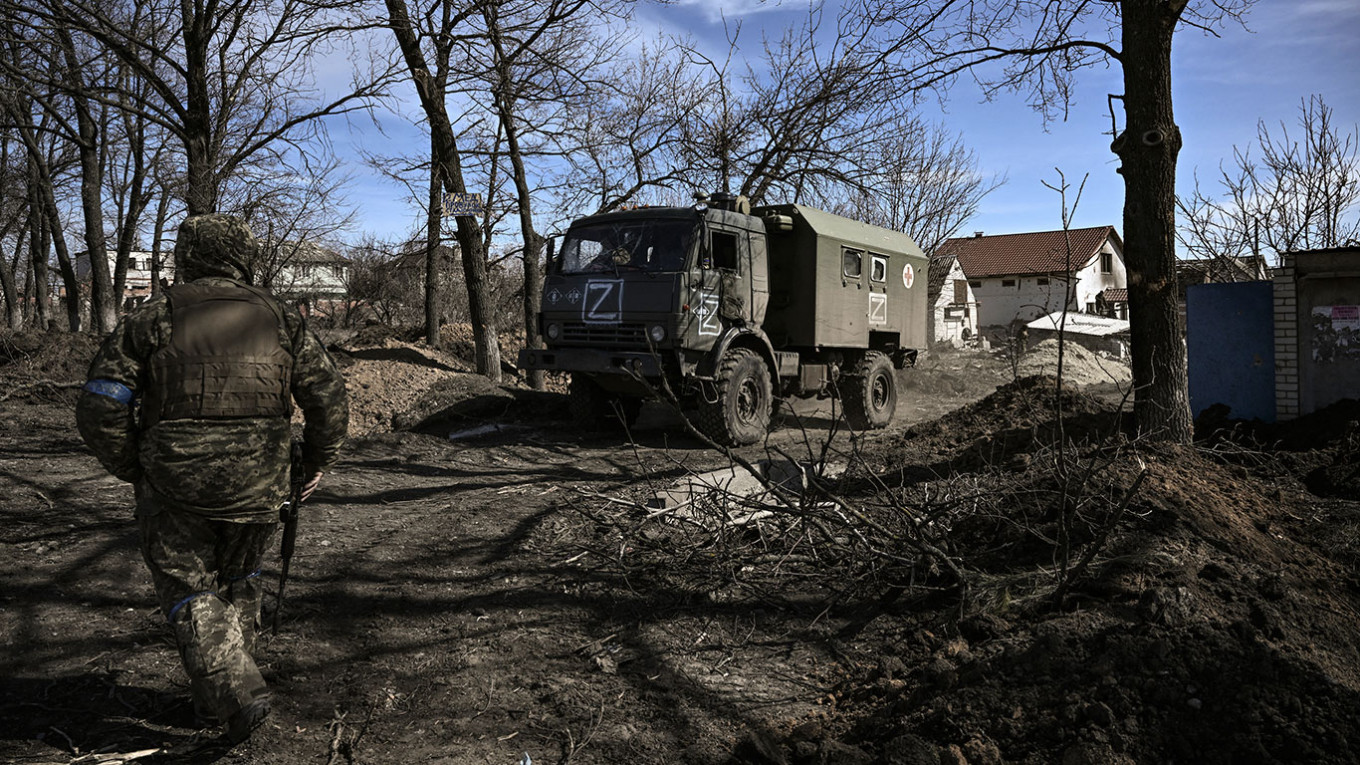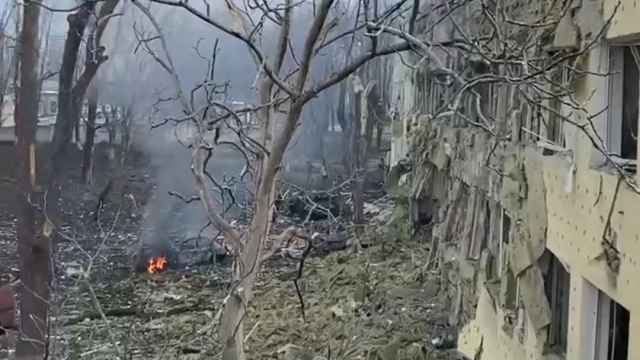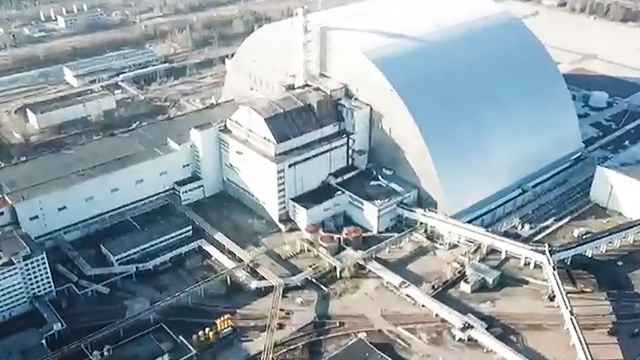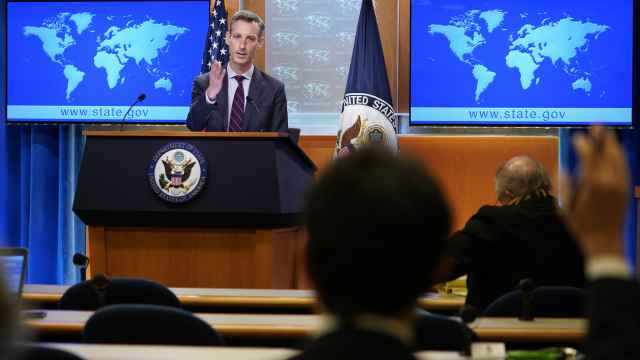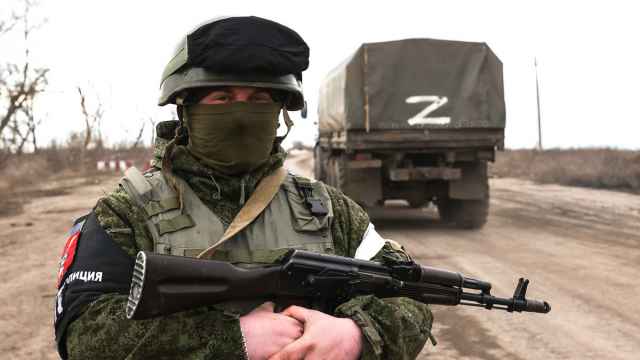Russia’s announcement that it would "drastically" scale down its military presence near the Ukrainian capital has triggered fears among pro-war factions at home that Russia is giving up on its goals.
Russian Deputy Defense Minister Alexander Fomin made the announcement Tuesday following Russian-Ukrainian peace talks in Istanbul, saying the decision was made in an effort to “increase mutual trust” and create conditions for a peace deal.
Vladimir Medinsky, the head of the Russian delegation, said Moscow would scale down its operations to the north of Kyiv and in the northern city of Chernihiv, 100 kilometers from the Russian border.
The statements – the first signs of a possible de-escalation by Russia after more than a month of fighting – were met with frustration by pro-war Russians, who say the Kremlin’s stated goals of “denazifying” and “demilitarizing” Ukraine are far from achieved.
“I myself was in a state of panic yesterday,” Alexander Prokhanov, a nationalist writer who has supported Russia’s war in Ukraine, told The Moscow Times of the news.
“Today I feel better. The night was accompanied by heavy bombardment of Ukrainian targets throughout the country, from Lviv to Donetsk,” said Prokhanov, who said he sees the war as an effort to address the wounds left open by the Soviet collapse.
Much of the criticism was directly aimed at Medinsky.
“Throughout the military operation and ongoing negotiations process, Medinsky made a few statements that bewildered many, even leading to hysteria in some cases,” Prokhanov continued.
“I think we need to stock up on tape, to tape Medinsky’s mouth.”
Chechen leader Ramzan Kadyrov also criticized Medinsky for being too soft on Ukraine in negotiations.
“We will not make concessions, Medinsky made a mistake, what he did was not right,” Kadyrov said.
Even some of the Kremlin’s most loyal propagandists, including state television anchor Vladimir Solovyov, were less than enthusiastic following the announcement.
“No one is going to give up. It is worth remembering that every time Putin announced the withdrawal of troops from Syria, our grouping there only increased,” Solovyov said.
Yet according to Alexei Mukhin from the Center for Political Information, a pro-Kremlin think tank, the decision to reduce military operations near Kyiv is a necessary step in bringing the “difficult” situation to an end.
“This is certainly a positive signal. Russia is giving Ukraine a chance to resolve this difficult situation. For the sake of Ukraine more than anything, it is holding out an olive branch.”
Amid the anger from pro-war factions, Kremlin spokesman Dmitry Peskov called for calm and played down expectations that the latest round of talks would yield tangible results.
“We don’t have any Stalingrads on our calendar, and nor should we. Most importantly, there should be no place for emotions,” Peskov said Wednesday.
“We can’t state anything very promising or any breakthroughs. There’s still a very, very long way to go,” he added.
Russia’s military campaign has stuttered and faltered since its outset, with failures to gain an early air superiority over its out-armed neighbor – as well as a failure to capture Kyiv, something widely believed to be part of the Kremlin’s initial aims.
Reports in the past week have indicated that Russia was losing ground in its advance toward the Ukrainian capital. Overextended supply lines have made Russian forces vulnerable to counter-attacks, enabling Ukraine to recapture the key city of Irpin and leading Western critics to dub Russia’s pledge to “reduce military activity” as a “retreat.”
“The war has not gone to plan from the very beginning,” military analyst Pavel Luzhin told The Moscow Times.
“However the Kremlin maintains its readiness to fight, and despite suffering heavy losses, it is not completely depleted,” Luzhin said.
For Mukhin, the negotiators’ pledge to de-escalate on the northern front falls in line with a carefully structured Kremlin plan.
“Clearly, this is part of the plan. Medinsky is unlikely to improvise. Every special operation requires adjustments, knowing how to perform, but in general, our common objectives are being achieved.”
Western officials called for caution Tuesday over Russia’s claims, with U.S. President Joe Biden saying he would wait to see the Kremlin back these statements up with actions.
Many observers fear that Tuesday’s pledge could be a smokescreen for Russian troops to regroup, with the worst of the war potentially still to come.
“I don’t see the Russian army leaving its positions near Kyiv. Some units left, yes, but this is rather a rotation and replacement of those who can no longer fight,” Luzhin said. “I believe that this could be preparation for a second offensive, not only in the Donbas, but in other areas as well.”
A Message from The Moscow Times:
Dear readers,
We are facing unprecedented challenges. Russia's Prosecutor General's Office has designated The Moscow Times as an "undesirable" organization, criminalizing our work and putting our staff at risk of prosecution. This follows our earlier unjust labeling as a "foreign agent."
These actions are direct attempts to silence independent journalism in Russia. The authorities claim our work "discredits the decisions of the Russian leadership." We see things differently: we strive to provide accurate, unbiased reporting on Russia.
We, the journalists of The Moscow Times, refuse to be silenced. But to continue our work, we need your help.
Your support, no matter how small, makes a world of difference. If you can, please support us monthly starting from just $2. It's quick to set up, and every contribution makes a significant impact.
By supporting The Moscow Times, you're defending open, independent journalism in the face of repression. Thank you for standing with us.
Remind me later.



